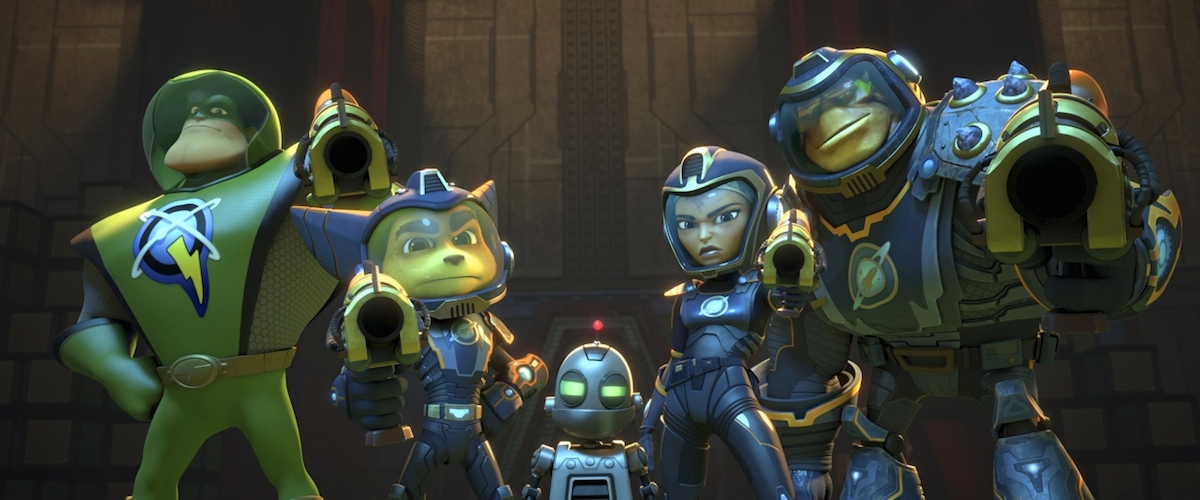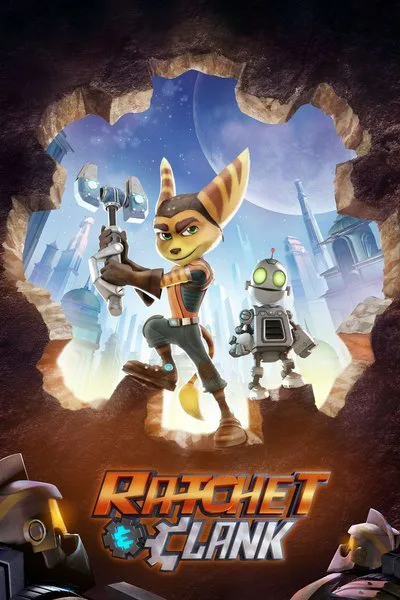Based on the video game franchise of the same name, “Ratchet & Clank”
makes a concerted effort to undermine and joke about the common, generic
elements of its story and its characters. It’s filled with establishing
subtitles, naming some alien planet and then subtitling the subtitle with, say,
a countdown to the dastardly villain’s inevitable speech that will lay out the
details for his wicked plan.
We get a training montage, of
course, but it’s preceded by a sub-subtitle informing us that one is on the
way. During that scene, the unlikely hero gets a chance to test out all of his
nifty, new weapons. Eventually, the leader of the team runs out of
neat-sounding names for all the cool weaponry, and he’s reduced to calling one
of them, which fires a sawblade, something along the lines of the “killer
buzzing thingy.”
The movie’s attitude is commendable.
It’s actually trying to have fun with material that should be fun, and it’s
also actively making fun of the pieces that are worthy of mockery. It’s as
innocent in its approach to all of this as a movie that features the
destruction of several planets can be, too.
The effort is often obvious, and
that means a good number of the jokes are funnier on a theoretical level than
they are on a practical one. That’s one issue. The other major one is that the
humor only goes so far. At some point, the movie has to rely on the things at
which it previously poked fun.
Our improbable hero is Ratchet
(voiced by James Arnold Taylor), one of the last of his species—a Lombax, which
looks mostly like a cat. He works as a mechanic in a desert valley of a planet
called Veldin. The movie’s bold color palette is striking, and it possesses an
admirable level of detail in creating a series of disparate worlds—from the
villain’s stark headquarters on a mountainous planet to a bustling metropolis
that serves as the backdrop for the movie’s first action sequence.
Ratchet dreams of one day becoming a
member of the Galactic Rangers, an elite quartet of warriors, led by the
egotistically dunderheaded Captain Qwark (voice of Jim Ward), who defend the
galaxy from evil. After a disastrous joyride in a souped-up flying car, Ratchet’s
boss/adoptive father Grim (voice of John Goodman), a purplish blob of a
creature with dangling ears and tusks, warns the Lombax that he needs to lower
his expectations for what he can get out of life.
The villain of the tale is Drek
(voice of Paul Giamatti), an industry titan with a pear-shaped head and flattop
haircut who rides around on a hovering cart. His plan is to annihilate a series
of planets, take the best sections of the ruins, and piece them together into
the utopia of his dreams. In the meantime, he has to worry about the fact that
his henchmen are more concerned with their cellphones than they are with his
orders.
Drek’s right-hand robot is Victor
Von Ion (voice of Sylvester Stallone), who longs to see real battle, and his
mad-scientist partner-in-crime is Dr. Nefarious (voice of Armin Shimerman), who
sees himself as more “vengeful” than “mad.” Ratchet’s
eventual, pintsized sidekick Clank (voice of David Kaye) is a defective model
in Drek’s army of robots. The cute little guy with a matter-of-fact way with
words and statistical probabilities of failure escapes the assembly line. Clank
makes an emergency landing on Veldin, where Ratchet learns of Drek’s evil plan
and is determined to stop the bad guy—hoping to become a member of the Galactic
Rangers in the process.
There’s a constant sense of competing
goals in the screenplay by T.J. Fixman (a regular writer for the game’s series
of sequels), Gerry Swallow, and director Kevin Munroe (Jericca Cleland served
as the movie’s co-director). It maintains a fairly consistent sense of humor,
especially as Ratchet becomes an instant celebrity, pushing the insecure Qwark
out of his accustomed spotlight, and begins his Ranger training. Once the plot
moves past this section, though, it essentially falls into the trap of
following an established pattern. There are land battles, dogfights among the
stars, betrayals, and the usual stuff of space operas.
The joking becomes secondary to the
need to hit the very elements of plot and character that the movie tries so
hard to undercut. In terms of character, Qwark’s oblivious hero-in-his-own-mind, Clank’s trusty
sidekick, and Drek’s quirky scoundrel are highlights. The rest of the Galactic
Rangers (voiced by Rosario Dawson, Bella Thorne, and Dean Redman) feel like
afterthoughts in search of personalities beyond the soldiers’ constant need to
shoot something. Ratchet is perhaps most notable as a hero for the plasma-beam
grappling hook he possesses.
There’s a fair amount to appreciate
about “Ratchet & Clank,” especially its desire to send up the
genre conventions at play here. It’s a shame, then, that the movie ultimately
finds itself becoming so conventional.




















